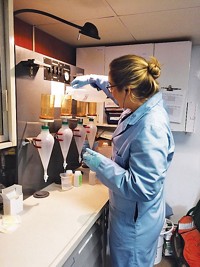Advertisement
Grab your lab coat. Let's get started
Welcome!
Welcome!
Create an account below to get 6 C&EN articles per month, receive newsletters and more - all free.
It seems this is your first time logging in online. Please enter the following information to continue.
As an ACS member you automatically get access to this site. All we need is few more details to create your reading experience.
Not you? Sign in with a different account.
Not you? Sign in with a different account.
ERROR 1
ERROR 1
ERROR 2
ERROR 2
ERROR 2
ERROR 2
ERROR 2
Password and Confirm password must match.
If you have an ACS member number, please enter it here so we can link this account to your membership. (optional)
ERROR 2
ACS values your privacy. By submitting your information, you are gaining access to C&EN and subscribing to our weekly newsletter. We use the information you provide to make your reading experience better, and we will never sell your data to third party members.
Policy
Getting Input
National Research Council endorses public involvement to enhance federal decisions on environment
by Cheryl Hogue
August 22, 2008
Public participation, when done properly, can improve the quality of federal decisions on the environment, says a report from the National Research Council (NRC).
Released on Aug. 22, the report says that involving the public can lead to a better environment and enhance the public???s trust in federal regulators.
NRC defines "public participation" as the engagement of individuals, groups, and the private sector to inform agencies making decisions that affect the environment.
Greater public participation would improve the federal process for making regulatory decisions beyond ones that affect the environment, says Rick Melberth, director of federal regulatory policy at OMB Watch. This watchdog group promotes government accountability and citizen participation in public policy decisions.
EPA, FDA, and the Departments of Agriculture and Energy asked NRC to conduct the study because public participation has supporters and detractors.
"Some critics of public participation practice have suggested that participation is too expensive and slow for what they contend are the minimal benefits it provides and that participation can degrade rather than improve decisions," especially when people are unfamiliar with the science involved, the report says. Proponents of public participation, meanwhile, say those who are directly affected by an environmental decision should have some influence on it.
NRC recommends that federal agencies incorporate public participation into their work "as a requisite of effective action, not merely a formal procedural requirement" to fulfill a duty mandated by a law. Regulators should commit to using input from the public to inform their actions, melding it with scientific analysis, the report adds.
In addition, the report calls for NSF, in partnership with agencies that make environmental decisions, to fund social sciences research on public participation in government decisions.




Join the conversation
Contact the reporter
Submit a Letter to the Editor for publication
Engage with us on Twitter